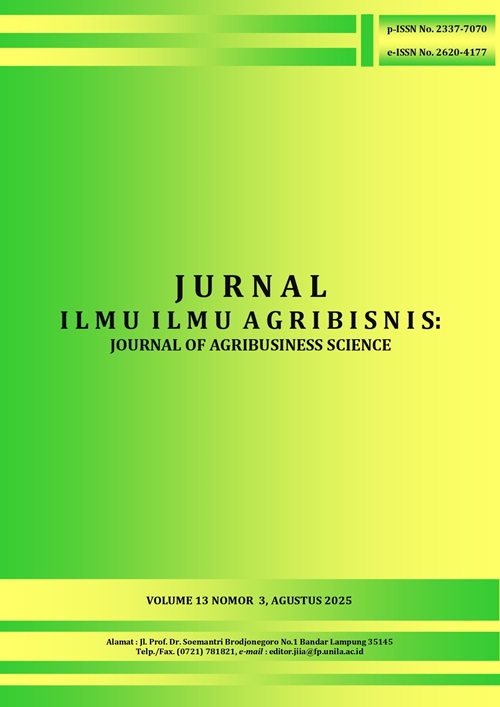ANALISIS NILAI TAMBAH, HARGA POKOK PRODUKSI, DAN KEUNTUNGAN AGROINDUSTRI SAMBAL TEMPOYAK (STUDI KASUS PADA AGROINDUSTRI MAUGI DI KOTA JAMBI)
DOI:
https://doi.org/10.23960/jiia.v13i3.7591 Abstract View: 330
Abstract View: 330
Abstract
This research intended to analyze the added value, the cost of goods sold, and the profit of Sambal Tempoyak Agroindustry. The method used was case study at Maugi Agroindustry in Alam Barajo District, Jambi City. Maugi Agroindustry is an agroindustry that actively produces sambal tempoyak, therefore the location of the research was chosen purposefully. Owners and employees of Maugi Agroindustry participated in this study as respondents. Data collection for this study was carried out from December 2022 to January 2023, and the data gathered was analyzed by employing descriptive qualitative and quantitative methods. The data required for this research were primary data from observations and questionnaires as well as secondary data from related literatures. In analyzing data, Hayami added value method and full costing method were utilised. Based on the research results, it is known that the Maugi Agroindustry producing sambal tempoyak in bottles of 200 grams, 150 grams, and 40 grams. It generates profits because the added value is greater than zero, so it is feasible to develop. The selling price of each package based on the Maugi Agroindustry policy is above the production cost which is calculated using the full costing method. The highest profit is for the 200 grams glass bottle sambal tempoyak and the lowest profit is for the 40 grams bottle sambal tempoyak.
Keywords: added value, cost, profit, sambal tempoyak
Downloads
Downloads
Published
How to Cite
Issue
Section
License
Authors who publish with this journal agree to the following terms:
Authors retain copyright and grant the journal right of first publication with the work simultaneously licensed under a Creative Commons Attribution License that allows others to share the work with an acknowledgement of the work's authorship and initial publication in this journal.
Authors are able to enter into separate, additional contractual arrangements for the non-exclusive distribution of the journal's published version of the work (e.g., post it to an institutional repository or publish it in a book), with an acknowledgement of its initial publication in this journal.
Authors are permitted and encouraged to post their work online (e.g., in institutional repositories or on their website) prior to and during the submission process, as it can lead to productive exchanges, as well as earlier and greater citation of published work (See The Effect of Open Access).














